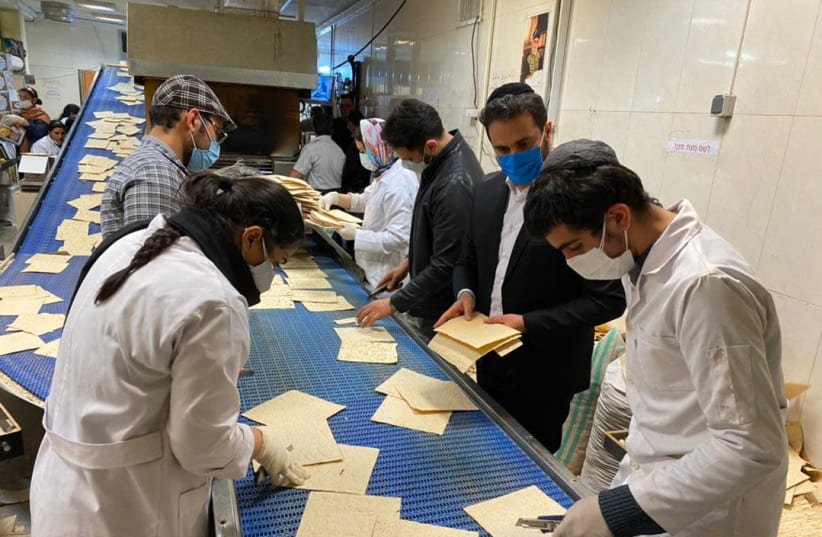With Passover less than two weeks away, much of the Jewish world is focusing on preparing for the Festival of Freedom, and Jews in Muslim lands are no exception.
Matzah baking is well underway in Iran and Bahrain, delivery of essential Passover items is gathering steam, and preparations for the seder, as well as pre-holiday events, are in full swing.
In Tehran, the matzah factory, which begins operating approximately three weeks before Passover begins, has been churning out several tons of machine-made matzah for the local community, overseen by Chief Rabbi of Tehran Rabbi Yehuda Gerami.
There are approximately 12,000 Jews in Iran, mostly in Tehran but with communities also in Shiraz, Isfahan and beyond.
In addition to the locally made matzah, some 250 kg. of “shmura matzah,” produced with greater stringency and by a more difficult process than regular matza, often used specifically on seder night, was imported into Iran from Azerbaijan.
And the Alliance of Rabbis in Islamic States (ARIS), an association of rabbis serving Jewish communities in 14 Muslim-majority countries, has been busy sending matzah to Jews in some of the most politically perilous places in the world, including Syria, Afghanistan, Libya and Lebanon.
In addition, the organization has sent several thousand seder boxes, including seder night essentials, to Jewish communities ahead of Passover, across the Muslim world, including Turkey, Azerbaijan, Uzbekistan, Nigeria, and beyond.
In Uzbekistan, Rabbi Shlomo Babaev from the capital city of Tashkent, prepared 560 bottles of wine for use at the seder and over Passover, and slaughtered 120 chickens brought to him by members of the Jewish community for consumption over the holiday.
“It is heartwarming to see how rabbis in Muslim countries are helping each other in providing logistics and assistance in transportation of matzah, to assure that every Jew is able to celebrate the holiday,” said chairman of the alliance Rabbi Mendy Chitrik.
“This year, the rabbis at the Alliance of Rabbis in Islamic States have provided Matzah and Pesach amenities to 14 ARIS member countries and to individuals in eight additional Muslim countries. The assistance of our governments in assuring that we can have our Passover religious needs cannot be overestimated.”
On the Arabian peninsula, the newly established Association of Gulf Jewish Communities imported some 300 kg. of matzot for local communities in the United Arab Emirates, Bahrain, Kuwait, and beyond.
There are around 1,200 Jews living in the Gulf countries, the overwhelming majority of whom are expats from around the world but they also include 50 Jews in a community dating back some 140 years in Bahrain.
The Bahraini Jewish community also produced some locally made matzah as well.
The Jewish Council of the Emirates, one of the major Jewish community organizations in the country, will be hosting a communal seder in Dubai on seder night next Saturday night, and expects between 100 to 150 guests.
Additionally, the AGJC leadership has been invited to Al Dhafra Air Base in Abu Dhabi where the JCE’s Chief Rabbi Yehuda Sarna and Senior Rabbi Eli Abadie, together with military chaplains and the Jewish Welfare Board, will host a Passover celebration with holiday food and conversation for US troops stationed at the base.
The program will also be webcast for other US bases in the Gulf, with an estimated 1,000 Jews.
Abadie will be leading a Zoom talk on the topic of “Seder Essentials,” with a 30-minute seder focusing on the themes of the holiday and a question and answer session.
“It is very exciting to see such demand for Passover programming in the Gulf this year,” said Rabbi Abadie. “As many will be leading their own seder this year due to less travel because of the pandemic, we are looking forward to offering the Seder Essentials webinar in order to provide them with tools and tips for doing so.”
